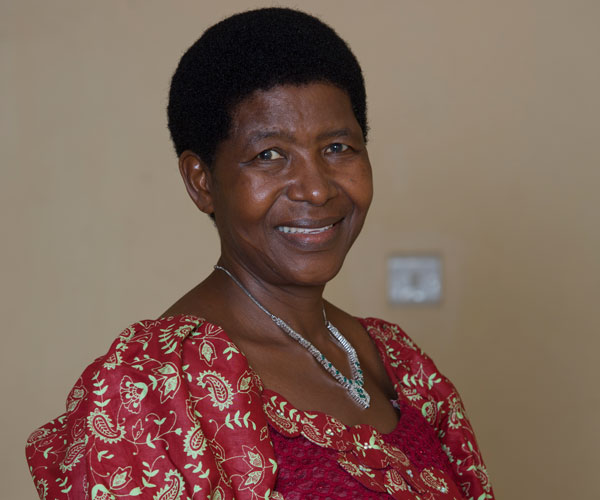Tanzanian geologist Evelyne I. Mbede is the recipient of the 2019 TWAS-C.N.R. Rao Award for scientific research. She is being honoured for her studies on volcanoes and seismicity in a region of geological importance – the exposed outcrops of the East African Rift.
Mbede, who was elected to TWAS in 2013, was born in the Southwestern highlands of Tanzania, where she grew up with a dream: to become an astronaut. She earned her PhD from the Technical University Berlin, in 1993, and a decade later she was appointed the head of the geology department at the University of Dar es Salaam (UDSM) in Tanzania.
This position opened the door for a brilliant career: she served as the head of the geology department from 2004 to 2006, being appointed the first female dean to the faculty of science (2006-2007). Then she was offered a position as the director of science technology innovation at the Ministry of Communication of Science and Technology (2007-2016). Today, she is an associate professor in Earth sciences at UDSM’s geology department.
"Those 10 years at the ministry were an experience I really enjoyed, but my heart beats for science. I am definitely a scientist and teaching is among my preferred activities," she said.
The TWAS award she has received came as a surprise. "I did not expect it at all," she remarked. "I was surprised when I got the notification, because I felt that my career was similar to that of other colleagues: we Tanzanian scientists are all equally passionate for our country."
The TWAS - C.N.R. Rao Award for scientific research is named after former TWAS's President C.N.R. Rao, a world-renowned chemist and a leading expert in solid state and materials chemistry. The award comes with a cash prize of USD5,000, and is designed to honour TWAS Fellows from the Least Developed Countries (LDCs) who have made significant contributions to global science.
Mbede has been studying Tanzanian geology for almost three decades. Part of her work is measuring and analysing geological features such as mountains. Another part is working with local populations to raise awareness about potential risks from active volcanoes and earthquakes.
"Preparedness is important," she asserted. "This is why, with my team, we constantly engage in advising the government about seismic risk. We also offer the population sound training on how to face earthquakes or volcanoes in case of eruptions."
Being a woman scientist was not always easy, she observed. "Especially during my years at the Ministry, I faced times where I had to be very firm in my position. But I always tried to have a clear vision of my role: to help young scientists and provide information about scholarships, and on how to advance in science."
During her mandate with the Ministry, Tanzania experienced a significant increase in government funding for science and technology from 2007 to 2017.
Mbede's current focus is on a new project that could boost Tanzania's economy: She is investigating the Rukwa Rift Basin, in Southwestern Tanzania. This is part of the east African Rift, one of largest active rifts in the world that needs constant monitoring. It’s also where several helium reservoirs could hide. Why is helium important?
"The global helium demand has more than doubled throughout the last 20 years as a consequence of new manufacturing and research techniques such as magnetic resonance imaging," she explained. Hence her interest in mapping the area, to identify potential helium reservoirs and to establish geological models that clarify helium generation and trapping under the sedimetary basins in the rift.
By mapping the Rukwa Rift Basin Mbede hopes to find hidden helium reservoirs.
"We believe that Tanzanian sedimentary rift basins hide substantial concentrations of helium," the scientist said. "This represents a great opportunity for Tanzania: it would pave the way to joint collaborations for researchers from UDSM and private companies, addressing questions of interest for the country. And it would help us build a new class of experts in various disciplines related to this research."
The helium project also holds great economic promise: it may increase the value of the basin and attract more investors to Tanzania. Ultimately, this would set in motion new government efforts towards industrialization, ensuring adequate and reliable supply of helium gas for diverse uses.
TWAS's award is surely an important recognition for Mbede. She plans to use it to buy some equipment needed for her research, but also to help young PhD students finish their education and publish scientific papers.
"The award will be especially important to establish new collaborations to increase our impact on the international scene,” she said. “And, of course, it will allow us to supplement our efforts in the field to collect more samples for the project in Rukwa basin. I am very excited!"
Cristina Serra

